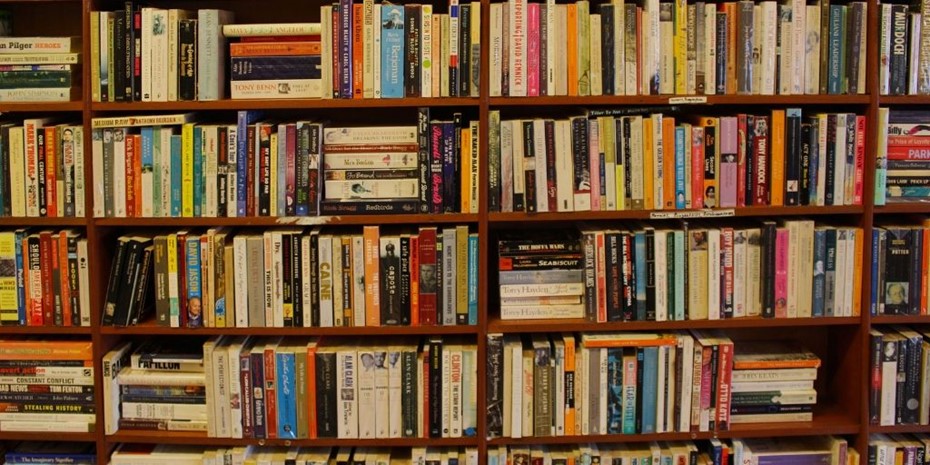



Search
Search our 7.958 News Items
CATEGORIES
We found 52 books in our category 'POETRY'
We found 2 news items
We found 52 books
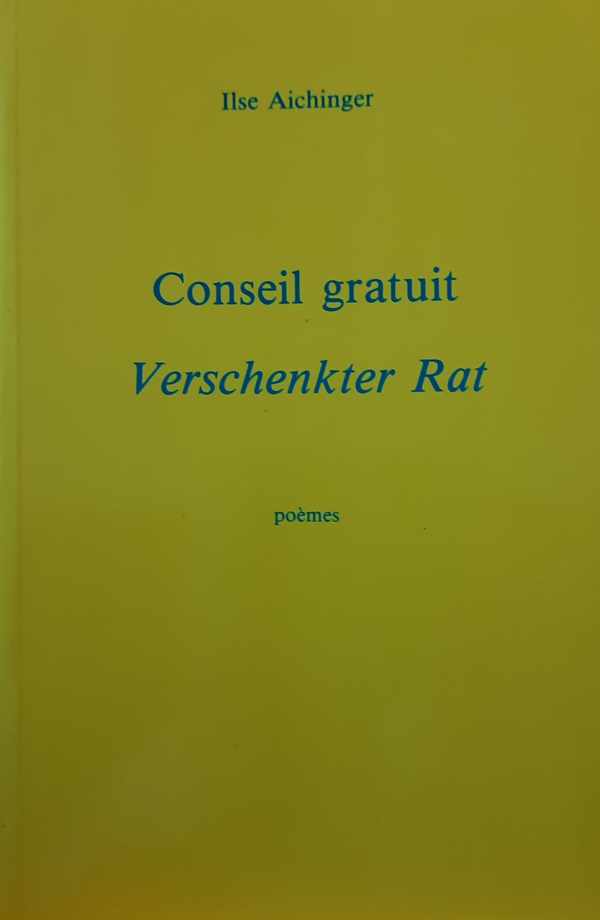
Leuven
Leuvense Schrijversaktie
1987
INT 
condition: Very good/Très bel état/Sehr gut/Zeer goed
book number: 202404091646
Conseil gratuit. Verschenkter Rat
Broché, in-8, 112 pp.
AICHINGER Ilse@ wikipedia
€ 15.0
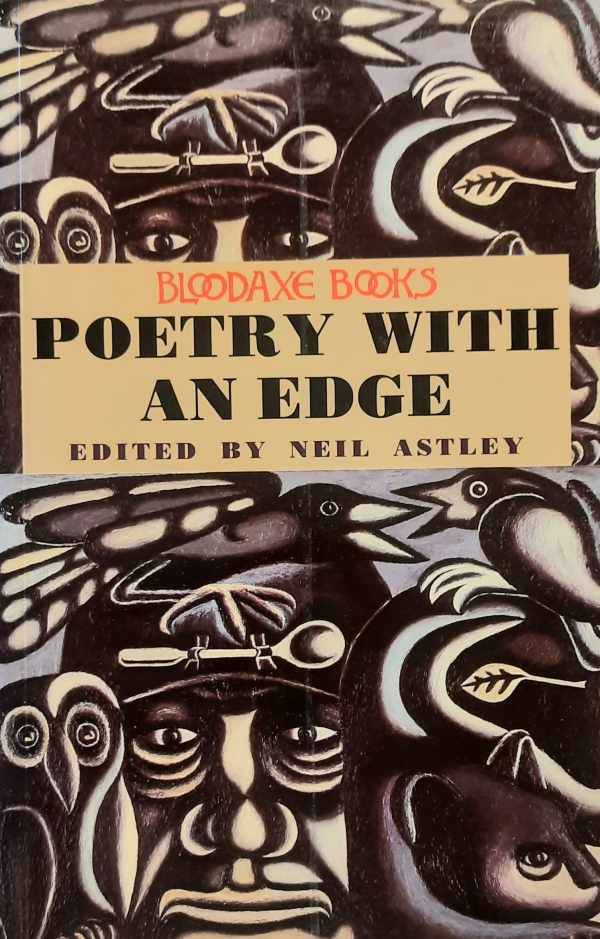
Newcastle
Bloodaxe Books
1993
GBR 
condition: Very good/Très bel état/Sehr gut/Zeer goed
book number: 202404161746
Poetry with an Edge
Paperback, in-8, 328 pp.
Bloodaxe's "house" anthology was first published to mark the press's tenth anniversary in 1988. This was a 320-page anthology. A revised, second edition appeared in 1993, with the same ISBN, expanded to 384 pages.With its bold, uncompromising "stable" of new and established British, Irish, American and European writers, Bloodaxe has revolutionised poetry publishing in Britain. Bloodaxe poets can't be labelled. They are all different, and they include some of the major writers of our time: Irina Ratushinskaya, Miroslav Holub, Tony Harrison, Denise Levertov, R.S. Thomas, Kamau Brathwaite, Marin Sorescu and Tomas Tranströmer. But if you want a definition of 'poetry with an edge', the poems in this book will supply it. Poetry with an Edge is a startling anthology of vital, vigorous poetry celebrating fifteen years of Bloodaxe Books.Sunday Times: 'Bloodaxe Books has established a ferocious reputation as a publisher of ground-breaking modern poetry.It has cornered a market in the publishing industry with flair, imagination and conspicuous success.'The Listener: 'Bloodaxe has been the liveliest and most innovative poetry house in the last couple of years...The moment a name starts buzzing on the poetry grapevine you can be sure that Bloodaxe will be on the trail.'Ambit: 'They are bold and prepared to take risks and put books on the market simply because they think they should be read.'Tribune: 'The poets are both new and downright expert.''This is a vital and catholic anthology, one of the best, in terms of value for money, since The Rattle Bag.' - David Profumo, Sunday Times'As an introduction to the best contemporary poetry, this anthology is invaluable.' - Peter Sirr, Irish Times
Bloodaxe's "house" anthology was first published to mark the press's tenth anniversary in 1988. This was a 320-page anthology. A revised, second edition appeared in 1993, with the same ISBN, expanded to 384 pages.With its bold, uncompromising "stable" of new and established British, Irish, American and European writers, Bloodaxe has revolutionised poetry publishing in Britain. Bloodaxe poets can't be labelled. They are all different, and they include some of the major writers of our time: Irina Ratushinskaya, Miroslav Holub, Tony Harrison, Denise Levertov, R.S. Thomas, Kamau Brathwaite, Marin Sorescu and Tomas Tranströmer. But if you want a definition of 'poetry with an edge', the poems in this book will supply it. Poetry with an Edge is a startling anthology of vital, vigorous poetry celebrating fifteen years of Bloodaxe Books.Sunday Times: 'Bloodaxe Books has established a ferocious reputation as a publisher of ground-breaking modern poetry.It has cornered a market in the publishing industry with flair, imagination and conspicuous success.'The Listener: 'Bloodaxe has been the liveliest and most innovative poetry house in the last couple of years...The moment a name starts buzzing on the poetry grapevine you can be sure that Bloodaxe will be on the trail.'Ambit: 'They are bold and prepared to take risks and put books on the market simply because they think they should be read.'Tribune: 'The poets are both new and downright expert.''This is a vital and catholic anthology, one of the best, in terms of value for money, since The Rattle Bag.' - David Profumo, Sunday Times'As an introduction to the best contemporary poetry, this anthology is invaluable.' - Peter Sirr, Irish Times
ASTLEY Neil@ wikipedia
€ 15.0
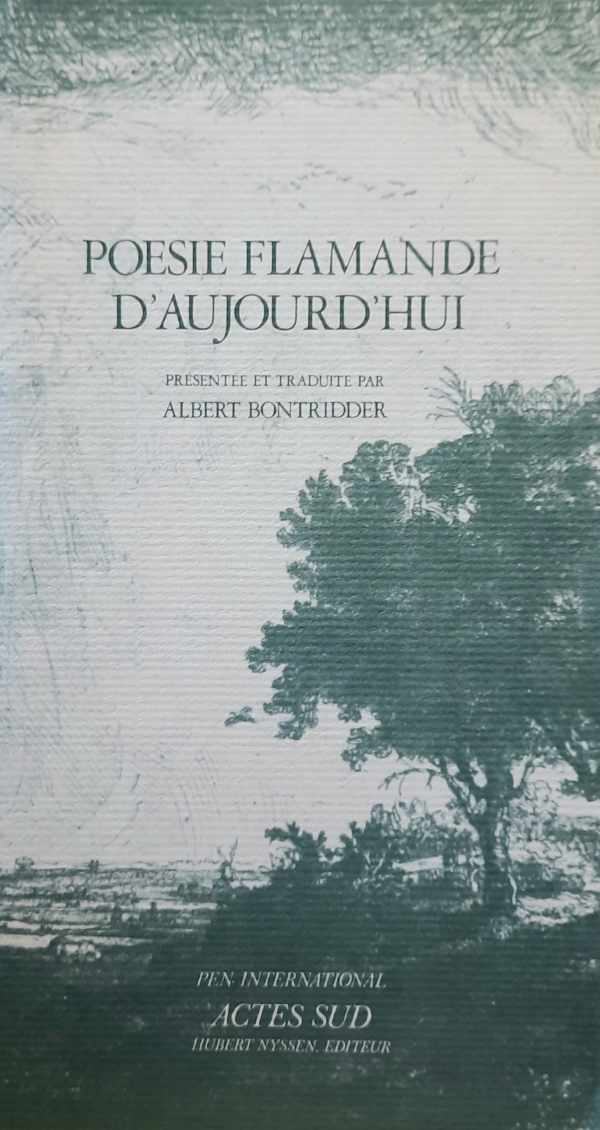
Bruxelles
Actes Sud
1986
BEL 
condition: Very good/Très bel état/Sehr gut/Zeer goed
book number: 202404121643
Poesie Flamande d'aujourd'hui
Broché, in-8, 171 pp.
BONTRIDDER Albert@ wikipedia
€ 10.0
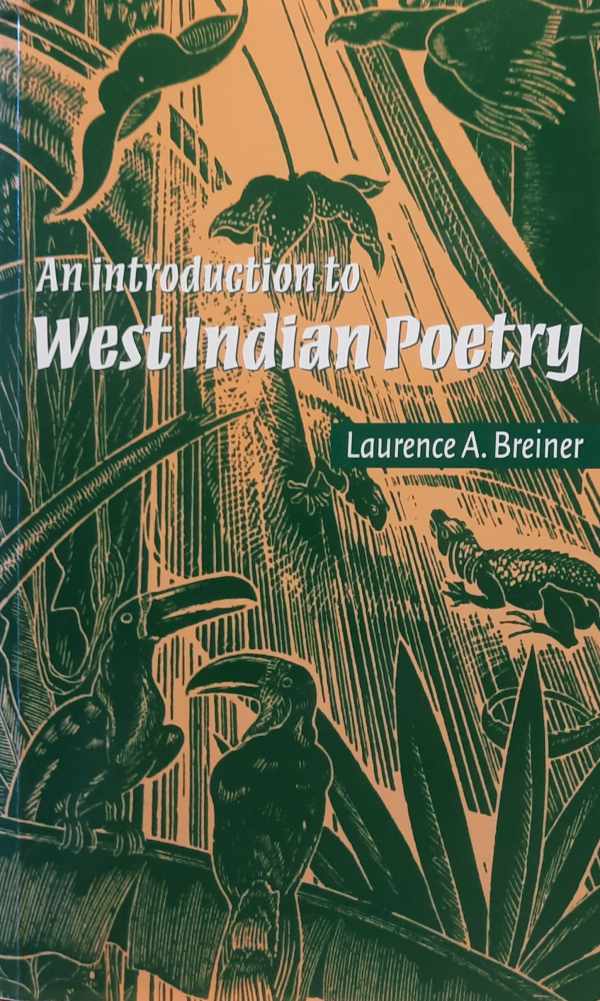
London
Cambridge University Press
1998
INT 
condition: Very good/Très bel état/Sehr gut/Zeer goed
book number: 202404151544
An Introduction to West Indian Poetry
Paperback, in-8, 290 pp.
This introduction to West Indian poetry is written for readers making their first approach to the poetry of the Caribbean written in English. It offers a comprehensive literary history from the 1920s to the 1980s, with particular attention to the relationship of West Indian poetry to European, African and American literature. Close readings of individual poems give detailed analysis of social and cultural issues at work in the writing. Laurence Breiner's exposition speaks powerfully about the defining forces in Caribbean culture from colonialism to resistance and decolonization.
This introduction to West Indian poetry is written for readers making their first approach to the poetry of the Caribbean written in English. It offers a comprehensive literary history from the 1920s to the 1980s, with particular attention to the relationship of West Indian poetry to European, African and American literature. Close readings of individual poems give detailed analysis of social and cultural issues at work in the writing. Laurence Breiner's exposition speaks powerfully about the defining forces in Caribbean culture from colonialism to resistance and decolonization.
BREINER Laurence A.@ wikipedia
€ 15.0
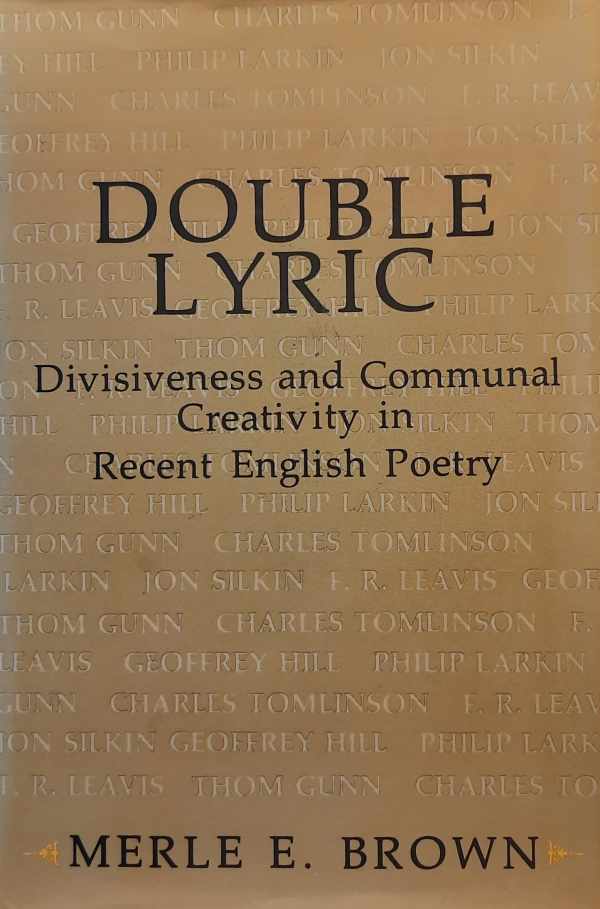
New York
Columbia University Press
1980
GBR 
condition: Very good/Très bel état/Sehr gut/Zeer goed
book number: 202404091757
Double lyric. Divisiveness and Communal Creativity in Recent English Poetry
Hardcover, dj, in-8, 235 pp., index.
BROWN Merle E.@ wikipedia
€ 20.0
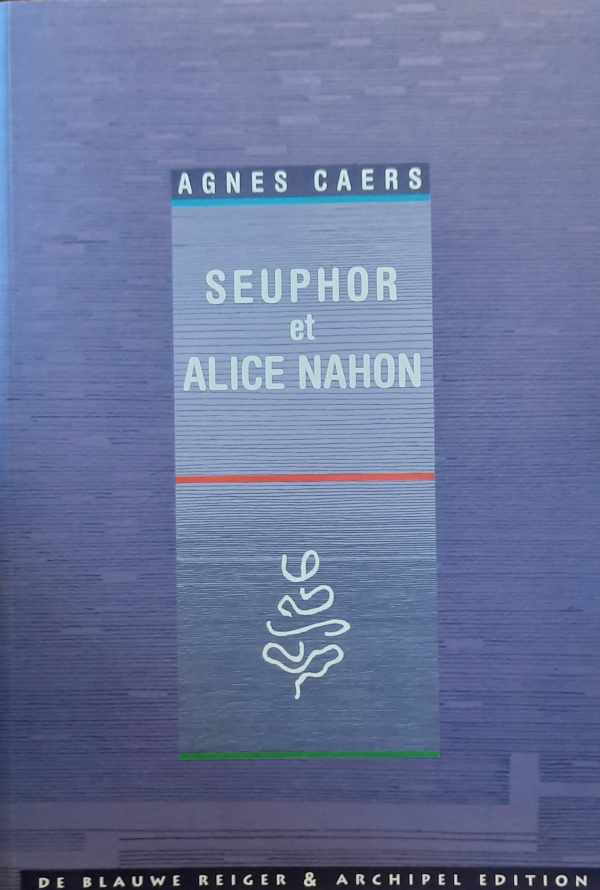
Antwerpen/Brussel
De blauwe reiger/Archipel
2006
BEL 
condition: Very good/Très bel état/Sehr gut/Zeer goed
book number: 202404121702
Seuphor et Alice Nahon
Broché, in-8, 94 pp., illustrations
CAERS Agnes@ wikipedia
€ 10.0

30 handgeschreven gedichten.
Softcover, pb, 4to.
CONTACT-LENS@ wikipedia
€ 10.0
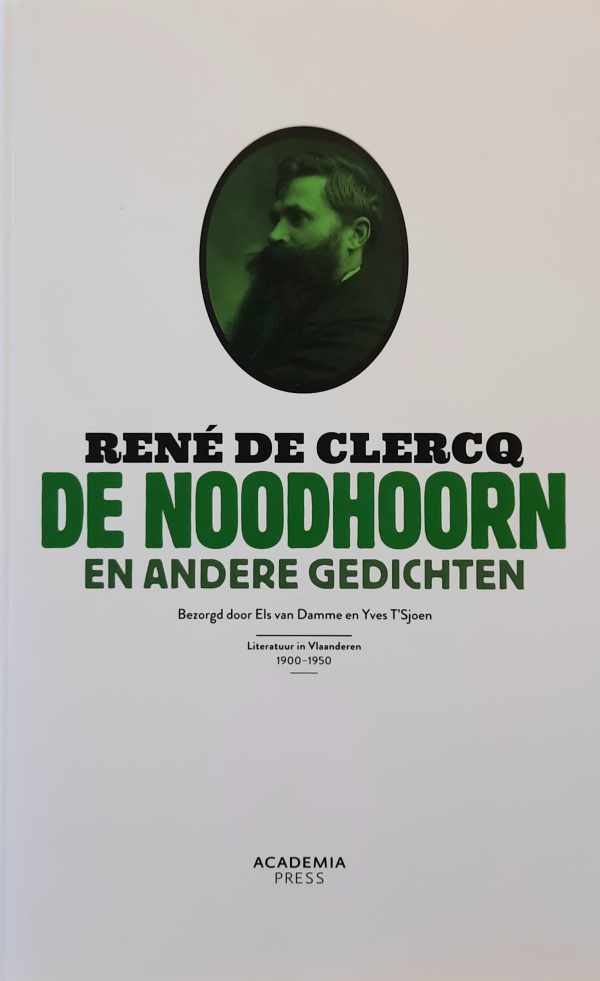
Gent
Academia Press
2018
BEL 
condition: Very good/Très bel état/Sehr gut/Zeer goed
book number: 202404121559
René de Clercq. De noodhoorn en andere gedichten
Paperback, in-8, 180 pp.
René de Clercq (1877-1932) is dichter van vaderlandslievende, sociaal bewogen en persoonlijke poëzie.00Tussen 1909 en 1916 publiceerde hij 'Toortsen' (1909), 'Uit de diepten' (1911) en 'De noodhoorn'. 'Vaderlandsche liederen' (1916). De gedichten laten een geleidelijke verschuiving zien van een belgicistisch naar een activistisch standpunt. Voor het eerst worden deze drie belangwekkende bundels in het omvangrijke oeuvre van De Clercq in een band aangeboden. De teksten worden weergegeven naar de eerste druk en zijn van een nabeschouwing voorzien door Joost Vandommele van het René de Clercqgenootschap.
René de Clercq (1877-1932) is dichter van vaderlandslievende, sociaal bewogen en persoonlijke poëzie.00Tussen 1909 en 1916 publiceerde hij 'Toortsen' (1909), 'Uit de diepten' (1911) en 'De noodhoorn'. 'Vaderlandsche liederen' (1916). De gedichten laten een geleidelijke verschuiving zien van een belgicistisch naar een activistisch standpunt. Voor het eerst worden deze drie belangwekkende bundels in het omvangrijke oeuvre van De Clercq in een band aangeboden. De teksten worden weergegeven naar de eerste druk en zijn van een nabeschouwing voorzien door Joost Vandommele van het René de Clercqgenootschap.
DE CLERCQ René@ wikipedia
€ 15.0

Paris
Grand Blue
1998
FRA 
condition: good, bon état
book number: 202303031607
Des poètes dans la Bataille de la Somme
Paperback, in-8, 67 pp., illustraties, bibliografische noten, bibliografie, index/register.
DECLERCQ Jean-Michel@ wikipedia
€ 10.0
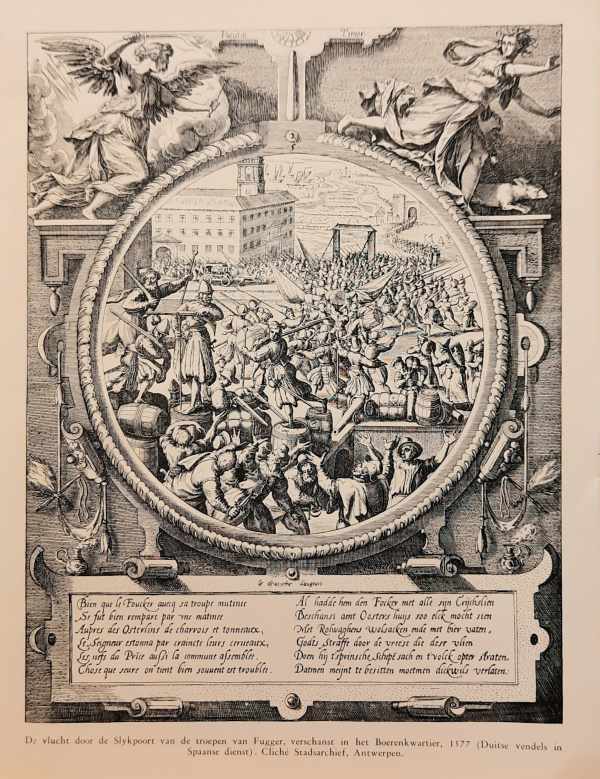
Antwerpen
Orion
1951
BEL 
condition: good, bon état
book number: 202402081657
Het geuzenlied. Bloemlezing. Ingeleid door Bert Decorte
Paperback, in-8, 39 pp.
DECORTE Bert@ wikipedia
€ 10.0

Bruxelles
Editions un coup de dés
1921
BEL 
condition: good, bon état
book number: 202307201702
La verdure Dorée
Paperback, in-8, 269 pp.
DERÈME Tristan@ wikipedia
€ 0.0
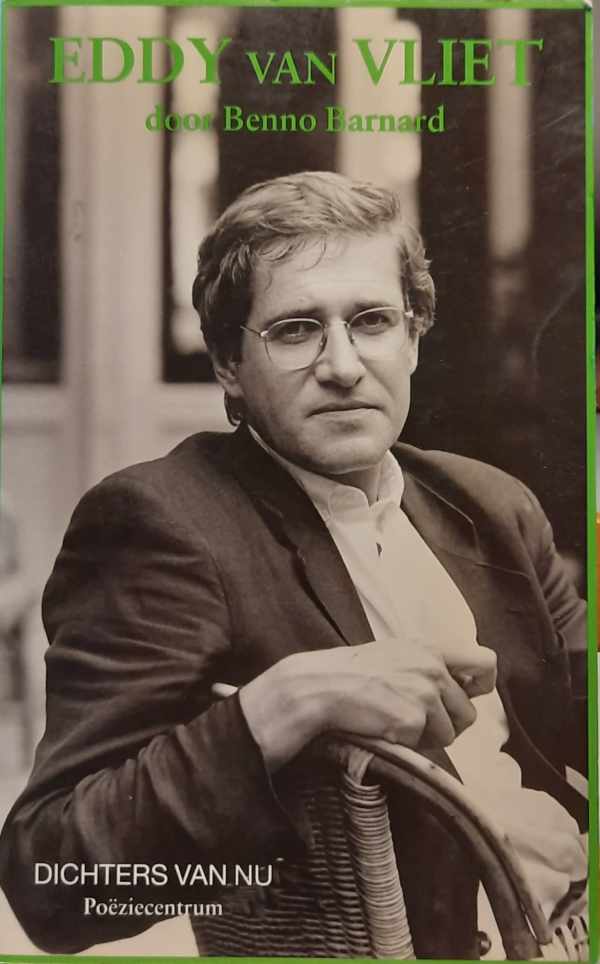
Gent
Poeziecentrum Gent
1992
BEL 
condition: Very good, très bel état
book number: 202402061454
Eddy van Vliet - een keuze uit de poëzie van Eddy van Vliet
Paperback, in-8, 256 pp.
Bio- en bibliografische informatie over de Vlaamse dichter (1942- ) en een keuze uit zijn werk.
Bio- en bibliografische informatie over de Vlaamse dichter (1942- ) en een keuze uit zijn werk.
Eddy van Vliet, Benno Barnard@ wikipedia
€ 10.0
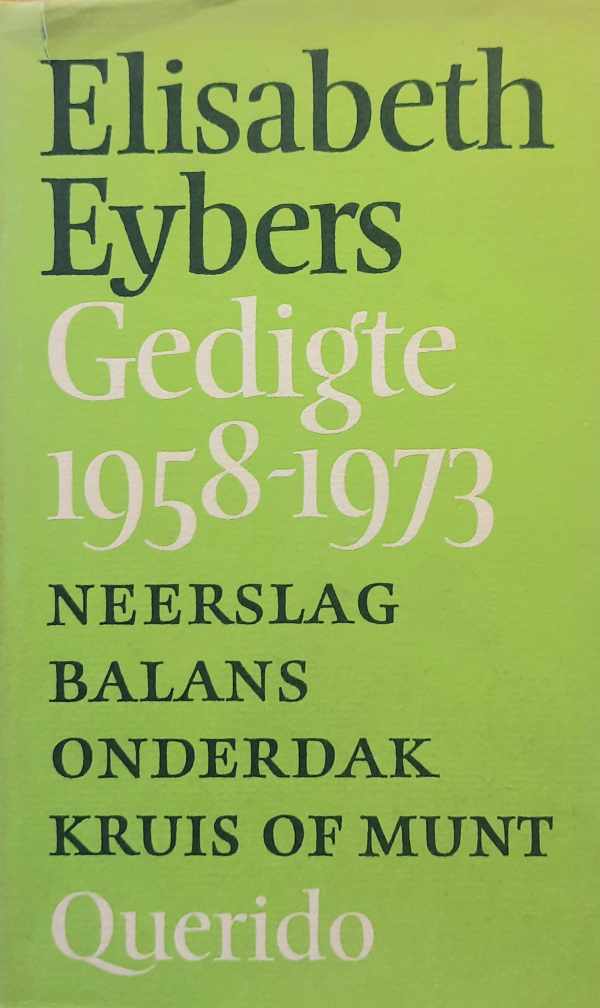
Amsterdam
Querido
1978
NLD 
condition: Very good/Très bel état/Sehr gut/Zeer goed
book number: 202404151716
Gedigte 1958-1973
Hardcover, stofwikkel, in-8, 216 pp.
EYBERS Elisabeth@ wikipedia
€ 15.0

Amsterdam
Kopernik
2016
condition: Very good, très bel état
book number: 202402011732
Gedicht aan de duur
Paperback, in-8, 55 pp.
HANDKE Peter@ wikipedia
€ 10.0

75 woorden
Hardcover, in-12, 79 pp.
HERMANS Toon@ wikipedia
€ 7.5
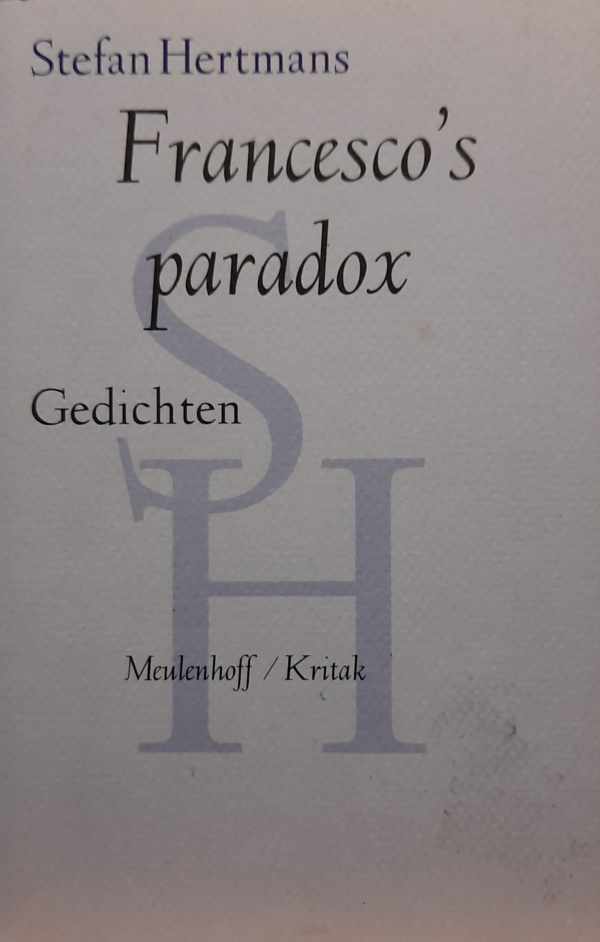
Amsterdam
Meulenhoff
1996
BEL 
condition: Very good, très bel état
book number: 202402061530
Francesco's paradox - gedichten
Paperback, in-8, 76 pp.
HERTMANS Stefan@ wikipedia
€ 10.0
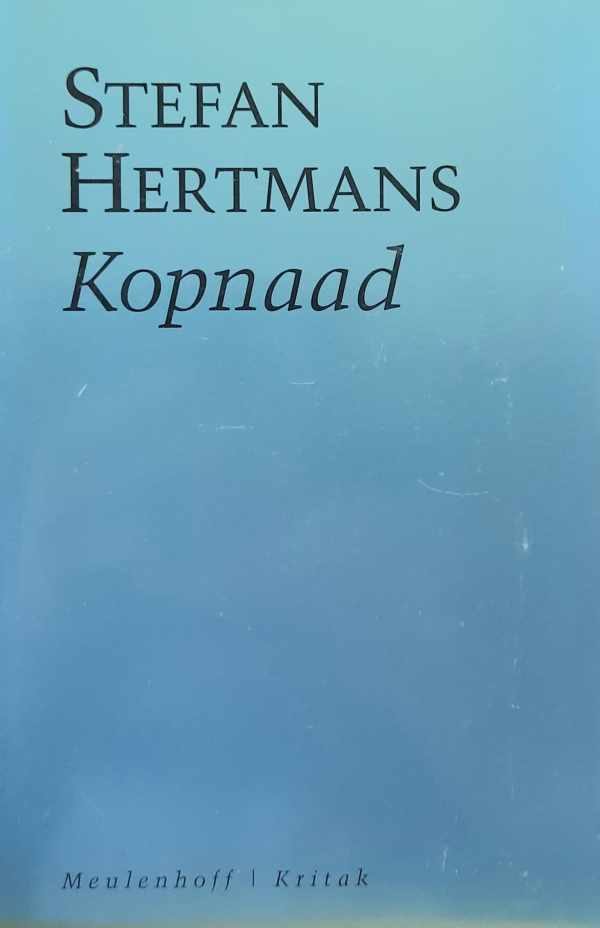
Amsterdam/Antwerpen
Kritak/Meulenhoff
1992
NLD 
condition: Very good/Très bel état/Sehr gut/Zeer goed
book number: 202404121641
Kopnaad - een tekst voor vier stemmen
Paperback, in-8, 78 pp., illustraties, bibliografische noten, bibliografie, index/register.
Toneeltekst over de waanzin.
Toneeltekst over de waanzin.
HERTMANS Stefan@ wikipedia
€ 10.0

Verhalend en essayistisch proza alsmede Gedichten
In de Reeks Pantheon der Nobelprijswinnaars Literatuur. Hardcover, gebonden, in-8,
HEYSE Paul / SPITTELER Carl@ wikipedia
€ 10.0
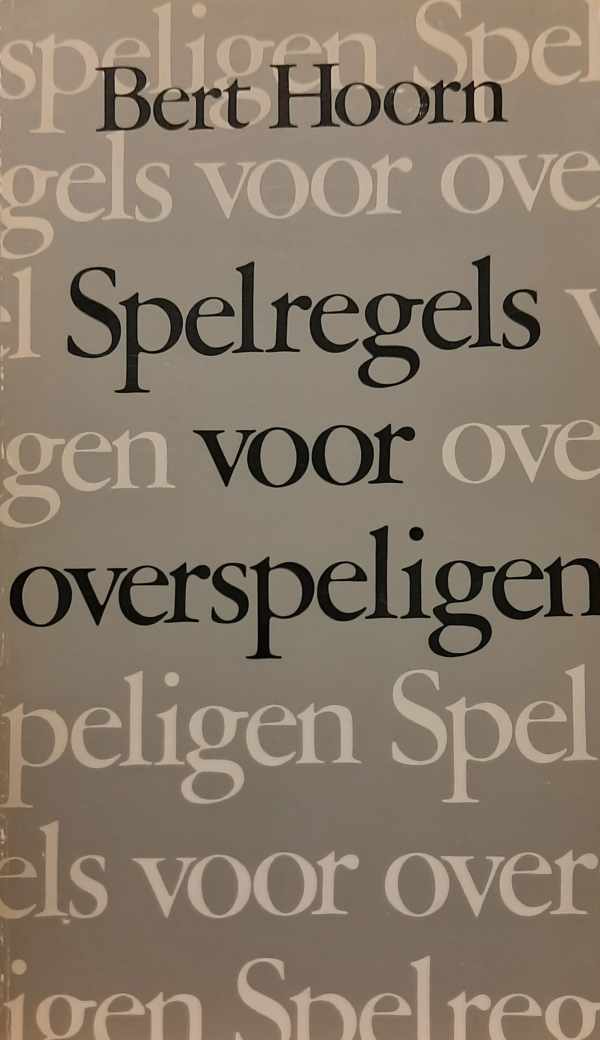
s-Gravenhage
Boekencentrum BV
1980
NLD 
condition: Very good, très bel état
book number: 202402221701
Spelregels voor overspeligen
Paperback, in-8, 162 pp.
HOORN Bert@ wikipedia
€ 10.0
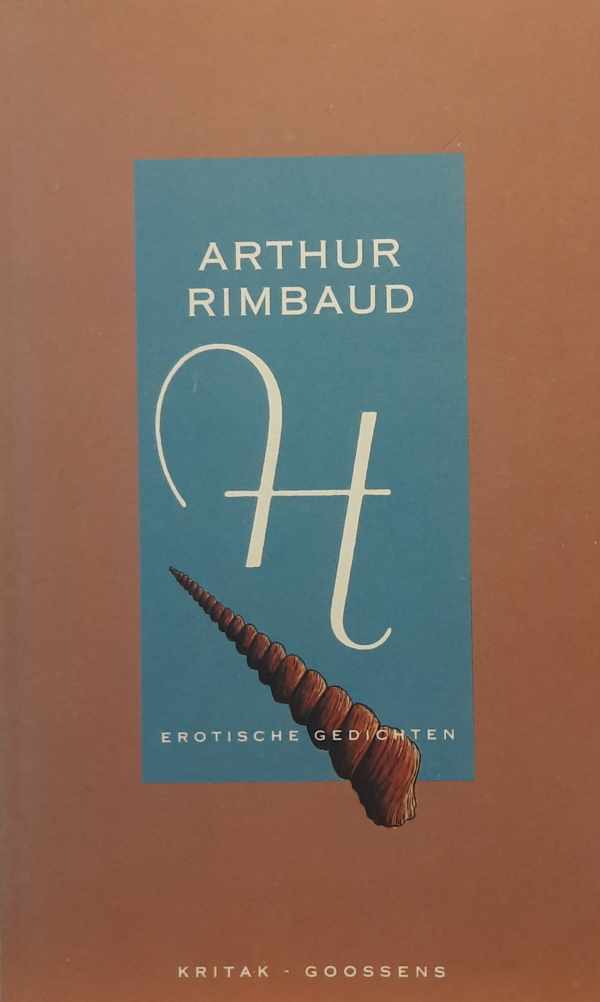
Leuven
Kritak
1993
FRA 
condition: Very good/Très bel état/Sehr gut/Zeer goed
book number: 202404151527
H - erotische gedichten
Paperback, in-8, 89 pp.
Erotische gedichten van de Franse dichter (1854-1891) met vertaling.
Erotische gedichten van de Franse dichter (1854-1891) met vertaling.
Jean Nicolas Arthur Rimbaud, Paul August Maria Jozef Claes@ wikipedia
€ 15.0
We found 2 news items
Elsa Morante in other languages in: New Italian Books
ID: 202107125529
12 July 2021
Author: Monica Zanardo, University of Padova
Elsa Morante in other languages in: New Italian Books
The international success of the books of Elsa Morante (1912-1985) more or less mirrors her publishing success and popularity in Italy. After the lukewarm reception of Menzogna e sortilegio (1948), L’isola di Arturo (1957) was immediately successful, thanks also to its being awarded the prestigious Strega Prize, which also gave her greater visibility abroad. Her standing abroad was further enhanced after the publication of La Storia (1974), which was successful in terms of both popularity and sales, paving the way for her penetration of the European book market with her last novel, Aracoeli (1982). This success also contributed (though to a lesser extent) towards the rediscovery of her debut novel, which remains, however, Morante’s least translated book.
There were only two translations of Menzogna e sortilegio in the 1950s: the American edition published in 1951 and the German edition published in Zürich in 1952. This edition, translated by Hanneliese Hinderberger (who would later also translate La Storia in 1976), was subsequently published by the prestigious Suhrkamp Verlag (from 1981), with an afterword by Dominique Fernandez. There was a totally different reaction to her book in America, translated by Adrienne Foulke, with the editorial assistance of Andrew Chiappe, and published by Harcourt Brace following the intervention of William Weaver. Published under the title House of Liars, the book was a total failure. Morante was very unhappy with the translation, not just because of the many inaccuracies, but, above all, because of the major cuts imposed on her novel, which was abridged by almost 20%. After almost 70 years, a new translation is planned for The New York Review of Books. Menzogna e sortilegio is still today the least translated of Morante’s novels, even less translated than the collection of short stories Lo scialle andaluso. The novel was only rediscovered after L’isola di Arturo (the novel which brought her domestic fame and opened the door for her in many parts of Europe) was translated into French in 1967 (by Michel Arnaud, but with significant editing for Gallimard’s prestigious “Du monde entier” series) and Polish in 1968 (by Zofia Ernstowa, with the poetic inserts entrusted to Jerzy Kierst). Only after the author’s death was the book published in Danish (1988, translated by Jytte Lollesgaard), Hebrew (2000, translated by Miryam Shusṭ erman-Padovano) and Spanish (2012, translated by Ana Ciurans Ferrándiz, and republished in 2017 with a foreword by Juan Tallón). In 2019, the publishers Kastaniotis announced the imminent release of a translation into Greek, while translations are also underway into Dutch (as part of a larger publishing project to publish all of Morante’s novels being carried out by Wereldbibliotheek) and Macedonian. The reception of Morante’s works in the Balkans is rather different, however, as the first of her novels to be published in that region was, in fact, Menzogna e sortilegio (published in Yugoslavia, in 1972, in Serbo-Croatian, in its Cyrillic version by Miodrag Kujundzić and Ivanka Jovičić), with the rediscovery much later of Isola di Arturo and La Storia (both were published in 1987, in, respectively, Serbia, translated by Jasmina Livada, and Bosnia, translated by Razija Sarajilić), and, in 1989, of Lo Scialle andaluso (published by the Serbian publishing house Gradina and translated by Ana Srbinović and Elizabet Vasiljević).
The international success of L’isola di Arturo [Arturo’s Island] was more straightforward, with the book translated into fourteen languages within ten years of its publication in Italy. It was almost immediately available in Scandinavia, with the Finnish translation published in 1958 (Alli Holma) and the Swedish translation (Karin Alin) and Norwegian translation (Hans Braarving) in the following year. Between 1959 and 1960, the book was also translated into German (Susanne Hurni-Maehler, who, in 1985, also retranslated Lo scialle andaluso, the first German version of which, translated by Kurt Stoessel, was published in Switzerland in 1960), into English (by Isabel Quigly for Collins, with a new translation in 2019 by Ann Goldstein, the American translator of Elena Ferrante, who also has in the pipeline a new translation of La Storia [History: A Novel]), into Spanish (Eugenio Guasta in Argentina, with a version published in Catalan, translated by Joan Oliver, in 1965), into Polish (Barbara Sieroszewska) and Dutch (J.H. Klinkert-Pötters Vos). During the 1960s translations were also published in French (in 1963, Michel Arnaud, who subsequently also translated Menzogna e sortilegio in 1967 and La Storia in 1977, while her collection of short stories Lo scialle andaluso were translated by Mario Fusco), in Japanese (Teruo Ōkubo), in Hungarian (Éva Dankó), in Portuguese (Hermes Serrão in 1966, with a new translation by Loredana de Stauber Caprara and Regina Célia Silva published by the Brazilian publishing house Berlendis & Vertecchia in 2003), in Romanian (Constantin Ioncică – still Morante’s only book to be translated into Romanian, though there should soon be available a translation of La Storia), in Korean (1989), in Macedonian (2017, Nenad Trpovski), in Turkish (2007, Şadan Karadeniz, who ten years earlier had also translated Lo scialle andaluso) and in Albanian (2019, Shtëpia Botuese). Translations of L’isola di Arturo are currently underway into Georgian and Czech, while Morante’s first book to be published in Lithuanian will also be L’isola di Arturo (Alma Littera).
Morante’s first book to be published in Denmark was La Storia (1977), translated by Jytte Lollesgard, who went on to complete the translations of all Morante’s novels into Danish (L’isola di Arturo in 1984, and Menzogna e sortilegio and Aracoeli, both published in 1988), as well as her collection of short stories Le straordinarie avventure di Caterina (1989). In Slovenia, the international success of La Storia curiously led to L’Isola di Arturo being rediscovered (1976, translated by Cvetka Žužek-Granata), while Aracoeli (1993) and La Storia (2006), translated respectively by Srečko Fišer and Dean Rajčić, did not appear until after the author’s death.
Two translations of La Storia deserve a special mention: the American translation, because it was followed closely by Morante, and the Spanish translation, because of the controversy it caused. In America, the book was translated by William Weaver and published by the Franklin Library First Edition Society, with an invaluable preface by Morante, who negotiated with her literary agent Erich Linder for the punctuation in the book’s English title. The Spanish edition (1976, translated by Juan Moreno), on the other hand, was publicly criticised by the author, who accused the publishers Plaza y Janés of having censored her book, though an uncensored version of the book did not become available in Spanish (translated by Esther Benitez) until 1991. This translation was subsequently revised in 2008 by Flavia Cartoni, who also wrote a foreword to the novel.
Before the author’s death, La Storia was translated into twelve languages (in addition to the English and Spanish versions, there were also translations into French, German, Portuguese, Dutch, Finnish, Danish, Swedish, Norwegian, Japanese and Chinese), with the book translated into another five languages by the end of the 1990s (Serbian, Czech, Hebrew, Turkish and Greek). Other languages have been added during the last twenty years, including Russian, Hungarian and Macedonian, but also Persian and Slovak (with La Storia being Morante’s only work to be published in these two languages in, respectively, 2003 and 2010). Curiously, the book has not been translated into Polish, but it has been recently translated (or is being translated) into Albanian, Rumanian, and even Arabic and Georgian.
Despite Morante’s well-established international reputation, Aracoeli did not achieve the same international reach. In 1984, the novel was translated into English, Spanish, German, Norwegian and French (by Jean-Noël Schifano, with the novel awarded the prestigious Prix Médicis étrangers) and, in 1985, into Swedish. Not until after her death was the novel also published in Finnish (1987), Danish and Czech (1988, when the Czech translation of La Storia was also published) and Slovene (1993). Aracoeli was Morante’s first work to be translated into both Greek and Hebrew. In Israel the translation of Aracoeli (1989, Miryam Shusṭ erman-Padovano) was followed, in 1994, by Lo scialle andaluso (Orah Ayal) and, going backwards, Morante’s other novels (La Storia, translated in 1995 by ʻImanuʼel Beʼeri; L’isola di Arturo and Menzogna e sortilegio, both translated by Miryam Shusṭ erman-Padovano and published in, respectively, 1997 and 2000). In Greece, the translation of Aracoeli (1989) paved the way for a very positive reception of Morante’s work and, in addition to the translations of her major novels and collections of short stories, there is one of the very rare translations of Il mondo salvato dai ragazzini (1996) and of the even less translated Lettere ad Antonio (published posthumously in Italy, edited by Alba Andreini, with title Diario 1938), which, besides Greek, can only be read in German and French.
Less successful, but nevertheless satisfactory, was the publication internationally of her collection of short stories Lo scialle andaluso (which have still not been translated into English), which were almost immediately translated into French and German, and then, during the 1980s, into Turkish, Estonian and Serbian. They can now also be read in Hebrew, Dutch, Spanish, Japanese, Albanian and Russian (the stories from Lo scialle andaluso and La Storia are Morante’s only works to be translated into Russian). They will soon be published in Portuguese, too. There are fewer translations of her short stories that were published posthumously. Racconti dimenticati have been translated into German, Greek, French and Dutch (in Dutch these short stories were published together with those from Lo scialle andaluso), with a Hebrew version currently underway; while Aneddoti infantili have only been translated into French (2015, Claire Pellissier). The collection of short stories for children, Straordinarie avventure di Caterina, have been fairly successful, however. They were translated almost immediately into Japanese and Hungarian, and, after the author’s death and during the 1990s, into French, Swedish, Danish, Spanish, Norwegian and German.
There are very few translations, however, of Alibi, the short collection of poems published by Longanesi in 1958. It was translated into French in 1999 (Jean-Noël Schifano, in a bilingual edition) and into Dutch in 2012 (Jan van der Haar, with the original and translation on opposite pages and a postword by Gandolfo Cascio, who was awarded the Morante Prize in 2016 for promoting Morante’s work in the Netherlands). Some individual poems have been translated, usually in magazines, as in the case of the poem that gives its name to the collection, which was translated into Polish in 1989 by Konstanty Jeleński, a friend of the author. Equally unsuccessful, partly because of the unusual form of the poems and their linguistic and conceptual complexity, and partly because they did not appeal to readers, is Il mondo salvato dai ragazzini (1968), which can only be read in French, Greek and English.
As for her literary and political writings, scant attention has been paid to Piccolo manifesto dei Comunisti (translated solely into French) and her sundry writings collected by Cesare Garboli in Pro o contro la bomba atomica e altri scritti, which can be read in German, French, Swedish, Spanish and Polish, and are currently being translated in Brazil. Her essay Sul Romanzo has been translated into Swedish, while her writings on Beato Angelico had already been translated in the 1970s.
While Elsa Morante’s minor works and poetry have a limited audience internationally, her novels, after she was awarded the prestigious Strega Prize and thanks also to the hard work of her literary agent Erich Linder, have received the attention they deserve (above all in France, Germany and Scandinavia, where they continue to be of interest). Moreover, following the author’s death, there have been publication projects in countries such as Israel, Greece and the Netherlands, to publish her complete works, some of which are nearing completion. The translation licences, some of which have been granted quite recently, confirm the continuing popularity of one of the most representative – and most represented – voices of twentieth-century Italian literature, with at least one of her works being translated into more than thirty language and whose books are distributed in all five continents.
Author: Monica Zanardo, University of Padova
Elsa Morante in other languages in: New Italian Books
The international success of the books of Elsa Morante (1912-1985) more or less mirrors her publishing success and popularity in Italy. After the lukewarm reception of Menzogna e sortilegio (1948), L’isola di Arturo (1957) was immediately successful, thanks also to its being awarded the prestigious Strega Prize, which also gave her greater visibility abroad. Her standing abroad was further enhanced after the publication of La Storia (1974), which was successful in terms of both popularity and sales, paving the way for her penetration of the European book market with her last novel, Aracoeli (1982). This success also contributed (though to a lesser extent) towards the rediscovery of her debut novel, which remains, however, Morante’s least translated book.
There were only two translations of Menzogna e sortilegio in the 1950s: the American edition published in 1951 and the German edition published in Zürich in 1952. This edition, translated by Hanneliese Hinderberger (who would later also translate La Storia in 1976), was subsequently published by the prestigious Suhrkamp Verlag (from 1981), with an afterword by Dominique Fernandez. There was a totally different reaction to her book in America, translated by Adrienne Foulke, with the editorial assistance of Andrew Chiappe, and published by Harcourt Brace following the intervention of William Weaver. Published under the title House of Liars, the book was a total failure. Morante was very unhappy with the translation, not just because of the many inaccuracies, but, above all, because of the major cuts imposed on her novel, which was abridged by almost 20%. After almost 70 years, a new translation is planned for The New York Review of Books. Menzogna e sortilegio is still today the least translated of Morante’s novels, even less translated than the collection of short stories Lo scialle andaluso. The novel was only rediscovered after L’isola di Arturo (the novel which brought her domestic fame and opened the door for her in many parts of Europe) was translated into French in 1967 (by Michel Arnaud, but with significant editing for Gallimard’s prestigious “Du monde entier” series) and Polish in 1968 (by Zofia Ernstowa, with the poetic inserts entrusted to Jerzy Kierst). Only after the author’s death was the book published in Danish (1988, translated by Jytte Lollesgaard), Hebrew (2000, translated by Miryam Shusṭ erman-Padovano) and Spanish (2012, translated by Ana Ciurans Ferrándiz, and republished in 2017 with a foreword by Juan Tallón). In 2019, the publishers Kastaniotis announced the imminent release of a translation into Greek, while translations are also underway into Dutch (as part of a larger publishing project to publish all of Morante’s novels being carried out by Wereldbibliotheek) and Macedonian. The reception of Morante’s works in the Balkans is rather different, however, as the first of her novels to be published in that region was, in fact, Menzogna e sortilegio (published in Yugoslavia, in 1972, in Serbo-Croatian, in its Cyrillic version by Miodrag Kujundzić and Ivanka Jovičić), with the rediscovery much later of Isola di Arturo and La Storia (both were published in 1987, in, respectively, Serbia, translated by Jasmina Livada, and Bosnia, translated by Razija Sarajilić), and, in 1989, of Lo Scialle andaluso (published by the Serbian publishing house Gradina and translated by Ana Srbinović and Elizabet Vasiljević).
The international success of L’isola di Arturo [Arturo’s Island] was more straightforward, with the book translated into fourteen languages within ten years of its publication in Italy. It was almost immediately available in Scandinavia, with the Finnish translation published in 1958 (Alli Holma) and the Swedish translation (Karin Alin) and Norwegian translation (Hans Braarving) in the following year. Between 1959 and 1960, the book was also translated into German (Susanne Hurni-Maehler, who, in 1985, also retranslated Lo scialle andaluso, the first German version of which, translated by Kurt Stoessel, was published in Switzerland in 1960), into English (by Isabel Quigly for Collins, with a new translation in 2019 by Ann Goldstein, the American translator of Elena Ferrante, who also has in the pipeline a new translation of La Storia [History: A Novel]), into Spanish (Eugenio Guasta in Argentina, with a version published in Catalan, translated by Joan Oliver, in 1965), into Polish (Barbara Sieroszewska) and Dutch (J.H. Klinkert-Pötters Vos). During the 1960s translations were also published in French (in 1963, Michel Arnaud, who subsequently also translated Menzogna e sortilegio in 1967 and La Storia in 1977, while her collection of short stories Lo scialle andaluso were translated by Mario Fusco), in Japanese (Teruo Ōkubo), in Hungarian (Éva Dankó), in Portuguese (Hermes Serrão in 1966, with a new translation by Loredana de Stauber Caprara and Regina Célia Silva published by the Brazilian publishing house Berlendis & Vertecchia in 2003), in Romanian (Constantin Ioncică – still Morante’s only book to be translated into Romanian, though there should soon be available a translation of La Storia), in Korean (1989), in Macedonian (2017, Nenad Trpovski), in Turkish (2007, Şadan Karadeniz, who ten years earlier had also translated Lo scialle andaluso) and in Albanian (2019, Shtëpia Botuese). Translations of L’isola di Arturo are currently underway into Georgian and Czech, while Morante’s first book to be published in Lithuanian will also be L’isola di Arturo (Alma Littera).
Morante’s first book to be published in Denmark was La Storia (1977), translated by Jytte Lollesgard, who went on to complete the translations of all Morante’s novels into Danish (L’isola di Arturo in 1984, and Menzogna e sortilegio and Aracoeli, both published in 1988), as well as her collection of short stories Le straordinarie avventure di Caterina (1989). In Slovenia, the international success of La Storia curiously led to L’Isola di Arturo being rediscovered (1976, translated by Cvetka Žužek-Granata), while Aracoeli (1993) and La Storia (2006), translated respectively by Srečko Fišer and Dean Rajčić, did not appear until after the author’s death.
Two translations of La Storia deserve a special mention: the American translation, because it was followed closely by Morante, and the Spanish translation, because of the controversy it caused. In America, the book was translated by William Weaver and published by the Franklin Library First Edition Society, with an invaluable preface by Morante, who negotiated with her literary agent Erich Linder for the punctuation in the book’s English title. The Spanish edition (1976, translated by Juan Moreno), on the other hand, was publicly criticised by the author, who accused the publishers Plaza y Janés of having censored her book, though an uncensored version of the book did not become available in Spanish (translated by Esther Benitez) until 1991. This translation was subsequently revised in 2008 by Flavia Cartoni, who also wrote a foreword to the novel.
Before the author’s death, La Storia was translated into twelve languages (in addition to the English and Spanish versions, there were also translations into French, German, Portuguese, Dutch, Finnish, Danish, Swedish, Norwegian, Japanese and Chinese), with the book translated into another five languages by the end of the 1990s (Serbian, Czech, Hebrew, Turkish and Greek). Other languages have been added during the last twenty years, including Russian, Hungarian and Macedonian, but also Persian and Slovak (with La Storia being Morante’s only work to be published in these two languages in, respectively, 2003 and 2010). Curiously, the book has not been translated into Polish, but it has been recently translated (or is being translated) into Albanian, Rumanian, and even Arabic and Georgian.
Despite Morante’s well-established international reputation, Aracoeli did not achieve the same international reach. In 1984, the novel was translated into English, Spanish, German, Norwegian and French (by Jean-Noël Schifano, with the novel awarded the prestigious Prix Médicis étrangers) and, in 1985, into Swedish. Not until after her death was the novel also published in Finnish (1987), Danish and Czech (1988, when the Czech translation of La Storia was also published) and Slovene (1993). Aracoeli was Morante’s first work to be translated into both Greek and Hebrew. In Israel the translation of Aracoeli (1989, Miryam Shusṭ erman-Padovano) was followed, in 1994, by Lo scialle andaluso (Orah Ayal) and, going backwards, Morante’s other novels (La Storia, translated in 1995 by ʻImanuʼel Beʼeri; L’isola di Arturo and Menzogna e sortilegio, both translated by Miryam Shusṭ erman-Padovano and published in, respectively, 1997 and 2000). In Greece, the translation of Aracoeli (1989) paved the way for a very positive reception of Morante’s work and, in addition to the translations of her major novels and collections of short stories, there is one of the very rare translations of Il mondo salvato dai ragazzini (1996) and of the even less translated Lettere ad Antonio (published posthumously in Italy, edited by Alba Andreini, with title Diario 1938), which, besides Greek, can only be read in German and French.
Less successful, but nevertheless satisfactory, was the publication internationally of her collection of short stories Lo scialle andaluso (which have still not been translated into English), which were almost immediately translated into French and German, and then, during the 1980s, into Turkish, Estonian and Serbian. They can now also be read in Hebrew, Dutch, Spanish, Japanese, Albanian and Russian (the stories from Lo scialle andaluso and La Storia are Morante’s only works to be translated into Russian). They will soon be published in Portuguese, too. There are fewer translations of her short stories that were published posthumously. Racconti dimenticati have been translated into German, Greek, French and Dutch (in Dutch these short stories were published together with those from Lo scialle andaluso), with a Hebrew version currently underway; while Aneddoti infantili have only been translated into French (2015, Claire Pellissier). The collection of short stories for children, Straordinarie avventure di Caterina, have been fairly successful, however. They were translated almost immediately into Japanese and Hungarian, and, after the author’s death and during the 1990s, into French, Swedish, Danish, Spanish, Norwegian and German.
There are very few translations, however, of Alibi, the short collection of poems published by Longanesi in 1958. It was translated into French in 1999 (Jean-Noël Schifano, in a bilingual edition) and into Dutch in 2012 (Jan van der Haar, with the original and translation on opposite pages and a postword by Gandolfo Cascio, who was awarded the Morante Prize in 2016 for promoting Morante’s work in the Netherlands). Some individual poems have been translated, usually in magazines, as in the case of the poem that gives its name to the collection, which was translated into Polish in 1989 by Konstanty Jeleński, a friend of the author. Equally unsuccessful, partly because of the unusual form of the poems and their linguistic and conceptual complexity, and partly because they did not appeal to readers, is Il mondo salvato dai ragazzini (1968), which can only be read in French, Greek and English.
As for her literary and political writings, scant attention has been paid to Piccolo manifesto dei Comunisti (translated solely into French) and her sundry writings collected by Cesare Garboli in Pro o contro la bomba atomica e altri scritti, which can be read in German, French, Swedish, Spanish and Polish, and are currently being translated in Brazil. Her essay Sul Romanzo has been translated into Swedish, while her writings on Beato Angelico had already been translated in the 1970s.
While Elsa Morante’s minor works and poetry have a limited audience internationally, her novels, after she was awarded the prestigious Strega Prize and thanks also to the hard work of her literary agent Erich Linder, have received the attention they deserve (above all in France, Germany and Scandinavia, where they continue to be of interest). Moreover, following the author’s death, there have been publication projects in countries such as Israel, Greece and the Netherlands, to publish her complete works, some of which are nearing completion. The translation licences, some of which have been granted quite recently, confirm the continuing popularity of one of the most representative – and most represented – voices of twentieth-century Italian literature, with at least one of her works being translated into more than thirty language and whose books are distributed in all five continents.
Land: ITA

MILL John Stuart (1806-1873): politieke economie, vrijheid en gezag
ID: 180605204545
John Stuart Mill (20 mei 1806 – 8 mei 1873) was een Engels filosoof en econoom, en de meest invloedrijke vrije denker van de 19e eeuw. Hij was een voorstander van het utilitarisme, de ethische theorie die voorgesteld werd door zijn peetvader Jeremy Bentham.
John Stuart Mill werd geboren in zijn vaders huis in Pentonville, Londen, als de oudste zoon van James Mill. Hij kreeg zijn onderwijs van zijn vader, met advies en assistentie van Jeremy Bentham en Francis Place. Hij kreeg een strenge opvoeding en werd nadrukkelijk afgeschermd van andere jongens van zijn leeftijd. Zijn vader, een navolger van Bentham, had als zijn specifieke doel om een genieus intellect te creëren dat de doelen en uitvoering van het utilisme zou doen verder leven na de dood van Bentham en hemzelf.
Tegen de tijd dat hij drie was kon hij het Griekse alfabet opnoemen, en toen hij acht werd had hij Aesopus' 'Fabels' gelezen en wist hij van Plato. In 1818 begon hij aan een studie logica en het jaar erop kreeg hij te maken met politieke economie.
Hij publiceerde zijn eerste belangrijke boek in 1842, The system of logic. Een van de belangrijkste theorieën is het beginsel van causaliteit – Als A altijd door B wordt gevolgd, kan worden verondersteld dat dit in de toekomst ook altijd zo zal zijn.
In 1869 publiceerde hij Subjection of Women, waarin hij de vrouwenrechten verdedigde. Hij was dan al vier jaar parlementslid waar hij eveneens ijverde voor het vrouwenkiesrecht en de vooruitstrevende liberalen steunde. Zijn vrouw Henriëtte, die in 1858 stierf, zou het boek geschreven hebben, maar op haar naam mocht het niet worden uitgegeven. Tot op de dag van vandaag staat het boek officieel op naam van John Stuart Mill.
http://nl.wikipedia.org/wiki/John_Stuart_Mill (20070226)
Writings by John Stuart Mill
[books / book excerpts]
· The Logic of the Moral Sciences. Excerpted from A System of Logic. London, 1843, 8th ed. 1872. [French translation]
· Essays on Some Unsettled Questions of Political Economy. London, 1844.
· Principles of Political Economy. London, 1848, 7th ed. 1871.
· On Liberty. London, 1859. [French translation]
· Dissertations and Discussions. London, 1859, 4th ed. 1882.
· Considerations on Representative Government. London, 1861.
· Utilitarianism. London, 1863. Reprinted from Fraser's Magazine, 1861. [French translation]
· Auguste Comte and Positivism. London, 1865. Reprinted from Westminster Review, 1865. [French translation]
· An Examination of Sir Hamilton's Philosophy. London, 1865.
· The Subjection of Women. London, 1869. [French translation] [Spanish translation]
· Autobiography. London, 1873. [French translation]
· Three Essays on Religion [Nature + Utility of Religion + Theism]. London, 1874.
· Chapters on Socialism. Fortnightly Review, 1879.
[articles]
· Free Discussion (1). Morning Chronicle, 1823.
· Free Discussion (2). Morning Chronicle, 1823.
· Free Discussion (3). Morning Chronicle, 1823.
· A Defense of Bentham. Excerpted from 'Whewell on Moral Philosophy'. Westminster Review, 1836.
· Note on N. W. Senior's Political Economy. In Senior's Outline of the Science of Political Economy, London, 1836.
· The Negro Question. Fraser's Magazine, 1850.
· Bentham. 1838, 2nd ed. 1859.
· The Contest in America. Fraser's Magazine, 1862.
· Inaugural Address. Delivered to the University of St. Andrews, 1867.
· Meetings in Royal Parks. Delivered in Parliament, 1867.
· Speech in Favour of Capital Punishment. Delivered in Parliament, 1868.
· Thornton on Labour and its Claims. Fortnightly Review, 1869.
· Theism. In Three Essays on Religion, London, 1874.
· Nature. In Three Essays on Religion, London, 1874.
· Utility of Religion. In Three Essays on Religion, London, 1874.
[letters]
· To James Mill. April 25, 1821.
· To ? March 18, 1840.
· To Gustave D'Eichthal. January 10, 1842.
· To ? May 13, 1865.
· To a Gentleman in Ohio. September 1, 1865.
--------------------------------------------------------------------------------
Writings about John Stuart Mill
[dictionary / encyclopaedia entries]
· John Stuart Mill. The Cambridge History of English and American Literature.
· John Stuart Mill. The Columbia Encyclopedia.
· John Stuart Mill. The Concise Encyclopedia of Economics.
· John Stuart Mill. Encyclopædia Britannica.
· John Stuart Mill. Encyclopædia Britannica (1911).
· John Stuart Mill. Internet Encyclopedia of Philosophy.
· John Stuart Mill. Island of Freedom.
· John Stuart Mill. The Johns Hopkins Guide to Literary Theory & Criticism.
· John Stuart Mill. The Literary Encyclopedia.
· John Stuart Mill. The Penguin Dictionary of Philosophy.
· John Stuart Mill. Spartacus Educational.
· John Stuart Mill. The Stanford Encyclopedia of Philosophy.
· John Stuart Mill. Wikipedia.
[other writings]
· Law Reform in England. The United States Democratic Review, 1851.
· John Stuart Mill and his Residence. Anonymous. Littell's Living Age, 1868.
· John Stuart Mill. By G. M. Towle. Appleton's Journal, 1870.
· John Stuart Mill. By M. D. Conway. Harper's New Monthly Magazine, 1873.
· The Reality of Duty. Anonymous. Littell's Living Age, 1876.
· John Stuart Mill (I). By Lyell Adams. New Englander and Yale Review, 1877.
· John Stuart Mill (II). By Lyell Adams. New Englander and Yale Review, 1877.
· John Stuart Mill (III). By Lyell Adams. New Englander and Yale Review, 1877.
· John Stuart Mill and the Destruction of Theism. By President Shairp. Princeton Review, 1878.
· James and John Stuart Mill. Littell's Living Age, 1882.
· John Stuart Mill and the London and Westminster Review. By C. Marion D. Robertson Towers. The Atlantic Monthly, 1892.
· A Letter to John Stuart Mill. By Winthrop More Daniels. The Atlantic Monthly, 1900.
· John Stuart Mill. By Leslie Stephen. In The English Utilitarians. London, 1900, vol. III.
· Variations in the Editions of J. S. Mill's Principles of Political Economy. By M. A. Ellis. Economic Journal, 1906.
· Biography. By O. M. W. Sprague. The Cambridge History of English and American Literature, Cambridge, 1921.
· John Stuart Mill: Traditional and Revisionist Interpretations. By John Gray. Literature and Liberty, 1979.
· Early Buddhism and John Stuart Mill's Thinking. By Vijitha Rajapakse. Philosophy East and West, 1987.
· J. S. Mill: the Utilitarian Influence in the Demise of laissez-faire. By Ellen Frankel Paul. Journal of Libertarian Studies, 1978.
· Wallace's Campaign to Nationalize Land. By M. Gaffney. The American Journal of Economics and Sociology, October 1, 1997.
· Utility and Preferences. By Soshichi Uchii. October 25, 1998.
· The Worm at the Root of the Passions: Poetry and Sympathy in Mill's Utilitarianism. By L. A. Paul. Utilitas, 1998.
· The Carlyle-Mill "Negro Question" Debate. ca. 2000.
· Mill, Liberty, and the Facts of Life. By Shannon C. Stimson and Murray Milgate. 2001.
· Mill's "Proof" of the Principle of Utility. By Geoffrey Sayre-McCord. Social Philosophy and Policy, 2001.
· J.S. Mill and the Diversity of Utilitarianism. By Daniel Jacobson. Philosophers' Imprint, 2003.
· Mill between Aristotle & Bentham. By Martha C. Nussbaum. Daedalus, March 22, 2004.
· The Ethics of Identity. By Kwame Anthony Appiah. The New York Times, June 12, 2005.
· The Influence of Mary Bentham on John Stuart Mill. By Catherine Pease-Watkin. Journal of Bentham Studies, 2006.
· Narrative, Imagination, and the Religion of Humanity in Mill's Ethics. By Colin Heydt. Journal of the History of Philosophy, 2006.
· Mill, Bentham and 'Internal Culture'. By Colin Heydt. British Journal for the History of Philosophy, May, 2006.
[reviews]
· Autobiography. New Englander and Yale Review, 1874.
· Autobiography. New Englander and Yale Review, 1874.
· Autobiography. Scribner's Monthly, 1874.
· Autobiography. North American Review, 1874.
· Autobiography. Littell's Living Age, 1874.
· Autobiography and Three Essays on Religion. New Englander and Yale Review, 1875.
· Considerations on Representative Government. New Englander and Yale Review, 1862.
· Dissertations and Discussions, Vols. I-III. New Englander and Yale Review, 1866.
· Dissertations and Discussions, Vol. IV. New Englander and Yale Review, 1867.
· Dissertations and Discussions, Vol. I. North American Review, 1865.
· Dissertations and Discussions, Vol. IV. North American Review, 1868.
· Examination of Sir Hamilton's Philosophy. New Englander and Yale Review, 1865.
· Inaugural Address at the University of St. Andrew's. North American Review, 1865.
· On Liberty. North America Review, 1863.
· On Liberty. The Cambridge History of English and American Literature, Cambridge, 1921.
· The Philosophy of Auguste Comte. New Englander and Yale Review, 1866.
· Principles of Political Economy. The Prospective Review, 1848.
· Principles of Political Economy. North American Review, 1848.
· Principles of Political Economy. North American Review, 1864.
· Principles of Political Economy. DeBow's Review, 1867.
· Principles of Political Economy. New Englander and Yale Review, 1872.
· Principles of Political Economy. The Cambridge History of English and American Literature, Cambridge, 1921.
· The Subjection of Women. North American Review, 1869.
· The Subjection of Women. New Englander and Yale Review, 1869.
· A System of Logic. North American Review, 1854.
· A System of Logic. The Cambridge History of English and American Literature, Cambridge, 1921.
· Three Essays on Religion. North American Review, 1875.
· Utilitarianism. The Cambridge History of English and American Literature, Cambridge, 1921.
http://www.utilitarian.net/jsmill/ (20070226)
John Stuart Mill werd geboren in zijn vaders huis in Pentonville, Londen, als de oudste zoon van James Mill. Hij kreeg zijn onderwijs van zijn vader, met advies en assistentie van Jeremy Bentham en Francis Place. Hij kreeg een strenge opvoeding en werd nadrukkelijk afgeschermd van andere jongens van zijn leeftijd. Zijn vader, een navolger van Bentham, had als zijn specifieke doel om een genieus intellect te creëren dat de doelen en uitvoering van het utilisme zou doen verder leven na de dood van Bentham en hemzelf.
Tegen de tijd dat hij drie was kon hij het Griekse alfabet opnoemen, en toen hij acht werd had hij Aesopus' 'Fabels' gelezen en wist hij van Plato. In 1818 begon hij aan een studie logica en het jaar erop kreeg hij te maken met politieke economie.
Hij publiceerde zijn eerste belangrijke boek in 1842, The system of logic. Een van de belangrijkste theorieën is het beginsel van causaliteit – Als A altijd door B wordt gevolgd, kan worden verondersteld dat dit in de toekomst ook altijd zo zal zijn.
In 1869 publiceerde hij Subjection of Women, waarin hij de vrouwenrechten verdedigde. Hij was dan al vier jaar parlementslid waar hij eveneens ijverde voor het vrouwenkiesrecht en de vooruitstrevende liberalen steunde. Zijn vrouw Henriëtte, die in 1858 stierf, zou het boek geschreven hebben, maar op haar naam mocht het niet worden uitgegeven. Tot op de dag van vandaag staat het boek officieel op naam van John Stuart Mill.
http://nl.wikipedia.org/wiki/John_Stuart_Mill (20070226)
Writings by John Stuart Mill
[books / book excerpts]
· The Logic of the Moral Sciences. Excerpted from A System of Logic. London, 1843, 8th ed. 1872. [French translation]
· Essays on Some Unsettled Questions of Political Economy. London, 1844.
· Principles of Political Economy. London, 1848, 7th ed. 1871.
· On Liberty. London, 1859. [French translation]
· Dissertations and Discussions. London, 1859, 4th ed. 1882.
· Considerations on Representative Government. London, 1861.
· Utilitarianism. London, 1863. Reprinted from Fraser's Magazine, 1861. [French translation]
· Auguste Comte and Positivism. London, 1865. Reprinted from Westminster Review, 1865. [French translation]
· An Examination of Sir Hamilton's Philosophy. London, 1865.
· The Subjection of Women. London, 1869. [French translation] [Spanish translation]
· Autobiography. London, 1873. [French translation]
· Three Essays on Religion [Nature + Utility of Religion + Theism]. London, 1874.
· Chapters on Socialism. Fortnightly Review, 1879.
[articles]
· Free Discussion (1). Morning Chronicle, 1823.
· Free Discussion (2). Morning Chronicle, 1823.
· Free Discussion (3). Morning Chronicle, 1823.
· A Defense of Bentham. Excerpted from 'Whewell on Moral Philosophy'. Westminster Review, 1836.
· Note on N. W. Senior's Political Economy. In Senior's Outline of the Science of Political Economy, London, 1836.
· The Negro Question. Fraser's Magazine, 1850.
· Bentham. 1838, 2nd ed. 1859.
· The Contest in America. Fraser's Magazine, 1862.
· Inaugural Address. Delivered to the University of St. Andrews, 1867.
· Meetings in Royal Parks. Delivered in Parliament, 1867.
· Speech in Favour of Capital Punishment. Delivered in Parliament, 1868.
· Thornton on Labour and its Claims. Fortnightly Review, 1869.
· Theism. In Three Essays on Religion, London, 1874.
· Nature. In Three Essays on Religion, London, 1874.
· Utility of Religion. In Three Essays on Religion, London, 1874.
[letters]
· To James Mill. April 25, 1821.
· To ? March 18, 1840.
· To Gustave D'Eichthal. January 10, 1842.
· To ? May 13, 1865.
· To a Gentleman in Ohio. September 1, 1865.
--------------------------------------------------------------------------------
Writings about John Stuart Mill
[dictionary / encyclopaedia entries]
· John Stuart Mill. The Cambridge History of English and American Literature.
· John Stuart Mill. The Columbia Encyclopedia.
· John Stuart Mill. The Concise Encyclopedia of Economics.
· John Stuart Mill. Encyclopædia Britannica.
· John Stuart Mill. Encyclopædia Britannica (1911).
· John Stuart Mill. Internet Encyclopedia of Philosophy.
· John Stuart Mill. Island of Freedom.
· John Stuart Mill. The Johns Hopkins Guide to Literary Theory & Criticism.
· John Stuart Mill. The Literary Encyclopedia.
· John Stuart Mill. The Penguin Dictionary of Philosophy.
· John Stuart Mill. Spartacus Educational.
· John Stuart Mill. The Stanford Encyclopedia of Philosophy.
· John Stuart Mill. Wikipedia.
[other writings]
· Law Reform in England. The United States Democratic Review, 1851.
· John Stuart Mill and his Residence. Anonymous. Littell's Living Age, 1868.
· John Stuart Mill. By G. M. Towle. Appleton's Journal, 1870.
· John Stuart Mill. By M. D. Conway. Harper's New Monthly Magazine, 1873.
· The Reality of Duty. Anonymous. Littell's Living Age, 1876.
· John Stuart Mill (I). By Lyell Adams. New Englander and Yale Review, 1877.
· John Stuart Mill (II). By Lyell Adams. New Englander and Yale Review, 1877.
· John Stuart Mill (III). By Lyell Adams. New Englander and Yale Review, 1877.
· John Stuart Mill and the Destruction of Theism. By President Shairp. Princeton Review, 1878.
· James and John Stuart Mill. Littell's Living Age, 1882.
· John Stuart Mill and the London and Westminster Review. By C. Marion D. Robertson Towers. The Atlantic Monthly, 1892.
· A Letter to John Stuart Mill. By Winthrop More Daniels. The Atlantic Monthly, 1900.
· John Stuart Mill. By Leslie Stephen. In The English Utilitarians. London, 1900, vol. III.
· Variations in the Editions of J. S. Mill's Principles of Political Economy. By M. A. Ellis. Economic Journal, 1906.
· Biography. By O. M. W. Sprague. The Cambridge History of English and American Literature, Cambridge, 1921.
· John Stuart Mill: Traditional and Revisionist Interpretations. By John Gray. Literature and Liberty, 1979.
· Early Buddhism and John Stuart Mill's Thinking. By Vijitha Rajapakse. Philosophy East and West, 1987.
· J. S. Mill: the Utilitarian Influence in the Demise of laissez-faire. By Ellen Frankel Paul. Journal of Libertarian Studies, 1978.
· Wallace's Campaign to Nationalize Land. By M. Gaffney. The American Journal of Economics and Sociology, October 1, 1997.
· Utility and Preferences. By Soshichi Uchii. October 25, 1998.
· The Worm at the Root of the Passions: Poetry and Sympathy in Mill's Utilitarianism. By L. A. Paul. Utilitas, 1998.
· The Carlyle-Mill "Negro Question" Debate. ca. 2000.
· Mill, Liberty, and the Facts of Life. By Shannon C. Stimson and Murray Milgate. 2001.
· Mill's "Proof" of the Principle of Utility. By Geoffrey Sayre-McCord. Social Philosophy and Policy, 2001.
· J.S. Mill and the Diversity of Utilitarianism. By Daniel Jacobson. Philosophers' Imprint, 2003.
· Mill between Aristotle & Bentham. By Martha C. Nussbaum. Daedalus, March 22, 2004.
· The Ethics of Identity. By Kwame Anthony Appiah. The New York Times, June 12, 2005.
· The Influence of Mary Bentham on John Stuart Mill. By Catherine Pease-Watkin. Journal of Bentham Studies, 2006.
· Narrative, Imagination, and the Religion of Humanity in Mill's Ethics. By Colin Heydt. Journal of the History of Philosophy, 2006.
· Mill, Bentham and 'Internal Culture'. By Colin Heydt. British Journal for the History of Philosophy, May, 2006.
[reviews]
· Autobiography. New Englander and Yale Review, 1874.
· Autobiography. New Englander and Yale Review, 1874.
· Autobiography. Scribner's Monthly, 1874.
· Autobiography. North American Review, 1874.
· Autobiography. Littell's Living Age, 1874.
· Autobiography and Three Essays on Religion. New Englander and Yale Review, 1875.
· Considerations on Representative Government. New Englander and Yale Review, 1862.
· Dissertations and Discussions, Vols. I-III. New Englander and Yale Review, 1866.
· Dissertations and Discussions, Vol. IV. New Englander and Yale Review, 1867.
· Dissertations and Discussions, Vol. I. North American Review, 1865.
· Dissertations and Discussions, Vol. IV. North American Review, 1868.
· Examination of Sir Hamilton's Philosophy. New Englander and Yale Review, 1865.
· Inaugural Address at the University of St. Andrew's. North American Review, 1865.
· On Liberty. North America Review, 1863.
· On Liberty. The Cambridge History of English and American Literature, Cambridge, 1921.
· The Philosophy of Auguste Comte. New Englander and Yale Review, 1866.
· Principles of Political Economy. The Prospective Review, 1848.
· Principles of Political Economy. North American Review, 1848.
· Principles of Political Economy. North American Review, 1864.
· Principles of Political Economy. DeBow's Review, 1867.
· Principles of Political Economy. New Englander and Yale Review, 1872.
· Principles of Political Economy. The Cambridge History of English and American Literature, Cambridge, 1921.
· The Subjection of Women. North American Review, 1869.
· The Subjection of Women. New Englander and Yale Review, 1869.
· A System of Logic. North American Review, 1854.
· A System of Logic. The Cambridge History of English and American Literature, Cambridge, 1921.
· Three Essays on Religion. North American Review, 1875.
· Utilitarianism. The Cambridge History of English and American Literature, Cambridge, 1921.
http://www.utilitarian.net/jsmill/ (20070226)
Land: GBR

